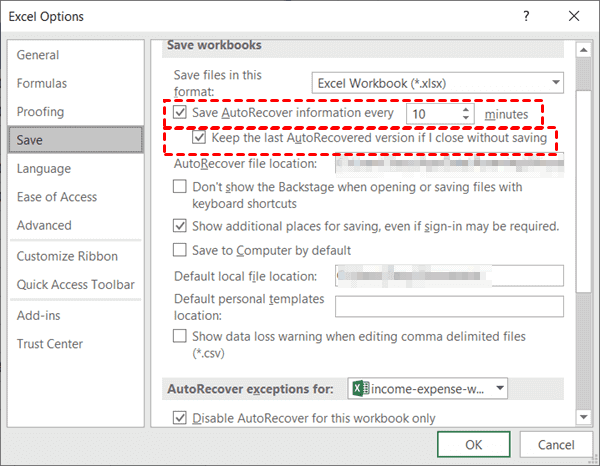Recover Your Lost Excel Sheet with These Simple Steps

Have you ever lost a crucial Excel file, only to realize hours, or even days later that you desperately need its contents? Losing important data can feel like the end of the world, but with the right tools and knowledge, recovering a lost or corrupted Excel sheet is not as daunting as it might seem. In this comprehensive guide, we'll explore several methods to retrieve your lost spreadsheets and share tips on preventing data loss in the future.
Understanding File Recovery Options

Before we dive into specific steps, it’s essential to understand the various scenarios in which your Excel file might have been lost or corrupted:
- Accidental deletion: You might have deleted the file thinking it was no longer needed.
- System crash or power outage: Sudden system failure can lead to file corruption.
- Virus or malware attack: Malicious software can corrupt or delete files.
- File system errors: Logical errors or issues with the file system can cause files to become inaccessible.
Step 1: Check for Backups

The first and often the simplest step is to check for backups:
- Local Backups: Look in any backup directories on your computer or external drives.
- Cloud Backups: If you use services like OneDrive, Dropbox, or Google Drive, check the version history or recycle bin.
- Auto Recovery: Excel often saves recovery versions that can be found by starting Excel, where it might prompt you to recover a file.
🔍 Note: Regular backups are a preventive measure, ensuring you have access to previous versions of your files.
Step 2: Use File History (Windows)

If you’re on a Windows machine with File History enabled:
- Open File Explorer.
- Right-click on the folder where the Excel file was stored.
- Choose Properties, then navigate to the Previous Versions tab.
- You’ll find a list of available backups; browse through them to locate your Excel file.
- Select the version you need and click Restore or Open.
Step 3: Employ Data Recovery Software

When backups fail or are nonexistent, data recovery software can be your next line of defense:
- Recuva: Popular for its ease of use and effectiveness.
- Stellar Data Recovery: Known for recovering files from various devices.
- Advanced Data Recovery: Offers powerful recovery options with deep scanning capabilities.
When using these tools:
- Download and install a reputable recovery tool.
- Ensure you are not saving new data where the lost file was stored to avoid overwriting.
- Perform a scan, choosing the drive where the file was originally located.
- Browse through the recovered files for your Excel document and save it to another location.
| Tool | Features |
|---|---|
| Recuva | User-friendly, deep scan, can recover from damaged disks |
| Stellar Data Recovery | Recover lost or deleted partitions, versatile file type support |
| Advanced Data Recovery | High success rate, preview before recovery, supports multiple devices |

📝 Note: Recovery software might not always retrieve the exact version you need but can save valuable data from a corrupted file.
Step 4: Check for Temporary Files

Excel often creates temporary files while you work on documents:
- Search for .tmp files in the location where your Excel file was saved.
- Use File Explorer’s search function with the keyword Excel or .xls* within the temporary files folder.
Preventing Future Losses

After going through the ordeal of data recovery, here are some measures to safeguard your data:
- Regular Backups: Schedule backups to an external drive or cloud services.
- AutoSave and AutoRecover: Enable Excel’s AutoSave feature and set frequent AutoRecover intervals.
- Version Control: Utilize OneDrive or similar services to keep multiple versions of your files.
- Regular Scans: Keep your system free from malware with regular antivirus scans.
- File Naming: Use clear and informative file names for easier tracking and recovery.
The Wrapping Up

Recovering a lost Excel file might seem like an impossible task at first glance, but with the right approach, patience, and tools, you can often retrieve your valuable data. Remember, the key to easy recovery lies in good practices like regular backups and understanding recovery options. Implementing these strategies can not only help recover lost files but also prevent similar issues in the future. Ensuring your data is backed up, securing it with version control, and utilizing Excel’s built-in recovery features will make the process of data recovery less stressful and more likely to succeed.
What are the common causes of Excel file loss?

+
Excel file loss can occur due to accidental deletion, system crashes, power outages, malware attacks, or file system errors.
Can I recover Excel files without backups?

+
Yes, you can often recover Excel files using data recovery software, even without backups, provided the data hasn’t been overwritten.
How often should I back up my Excel files?

+
Ideally, backup your files daily if they contain critical information or at least weekly for less critical data.